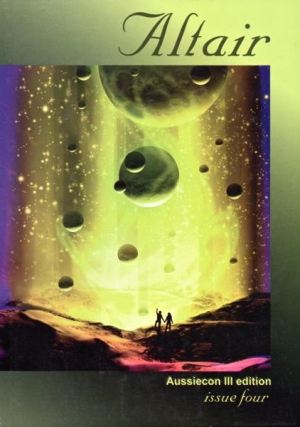Birthday Reviews: Stanisław Lem’s “Ijon Tichy’s Last Journey to Earth”

Stanisław Lem was born on September 12, 1921 and died on March 27, 2006.
Polish author Stanisław Lem won the Seiun Award in 1977 for his short story “Rozprawa” and the Geffen Award for the novel Solaris, which was thrice adapted for film, first in 1968 for Soviet television by Lidiya Ishimbaeva and Boris Nirenburg, second by Andrei Tarkovsky in the Soviet Union in 1972, and finally by Steven Soderbergh in 2002. Lem has also received the City of Krakow’s Prize in Literature, several prizes from the Polish government during the Communist period, the Grand Prix de Littérature Policière, the Franz Kafka Prize, and was made a member of the Order of the White Eagle. In 1973 Lem was given an honorary membership in SFWA, but once he was eligible for a regular membership, the bylaws of the organization required the honorary membership to be rescinded, which caused an uproar among some members.
“Ijon Tichy’s Last Journey to Earth,” which was written as Ostatnia Podroz Ijona Tichego, was published in English in August 1999 in Altair #4, without a previous Polish publication. It was translated by a team comprised of Kurt von Trojan, Robert N. Stephenson, and Ela Wroaebel. The magazine was edited by Andrew Collings, Jim Deed, and Robert N. Stephenson. The story was later translated into German as “Ijon Tichys letzte Reise” and published by Wolfgang Jeschke in the anthology Reptilienliebe.
Stanisław Lem’s Ijon Tichy stories are not hard science fiction, but rather social satire, usually showing the title character traveling to distant planets and observing and commenting on their customs, which are often strangely reminiscent of human custom. Most of the stories have been collected in Lem’s book The Star Diaries. “Ijon Tichy’s Last Journey to Earth” has a recursive component in that Tichy refers to his own book The Star Diaries as a narrative of his travels and implies that the story he is currently relating will appear in a future edition of the book.
Tichy’s set up for the story is that he has been exploring the Cassiopeia constellation for the past six years (although his references to “Cassiopeia’s eight supermoon” indicates that Lem isn’t aware of, or care about, the difference between a constellation and a planetary system) and is returning to Earth for the first time in several years. Upon his arrival, he notices that men and women seem to have swapped traditional attire, with men wearing skirts and women wearing pants. Furthermore, it seems to him that people are being chased through the streets by people wielding butterfly nets. He seeks out someone to explain the cultural changes to him.
Tichy learns about the rise of the internet and how easy it is to defraud people. In many ways, his view of the future of the web is spot on, although Lem tends to be somewhat scattershot with his extrapolation in this story, not only touching on fraud, but gender (and sexual) relationships, reproduction, and personal rights. The story progresses without a cohesive theme or a way to tie the various changes in society together, which makes the story feel almost more like an outline of topics that Lem wanted to vent about rather than a fully constructed tale.
Reviewed in its original appearance in the magazine Altair #4, translated by Kurt von Trojan, Robert N. Stephenson, and Ela Wroaebel, edited by Andrew Collings, Jim Deed, and Robert N. Stephenson, August 1999.
 Steven H Silver is a sixteen-time Hugo Award nominee and was the publisher of the Hugo-nominated fanzine Argentus as well as the editor and publisher of ISFiC Press for 8 years. He has also edited books for DAW and NESFA Press. He began publishing short fiction in 2008 and his most recently published story is “Doing Business at Hodputt’s Emporium” in Galaxy’s Edge. Steven has chaired the first Midwest Construction, Windycon three times, and the SFWA Nebula Conference 6 times, as well as serving as the Event Coordinator for SFWA. He was programming chair for Chicon 2000 and Vice Chair of Chicon 7. He has been the news editor for SF Site since 2002.
Steven H Silver is a sixteen-time Hugo Award nominee and was the publisher of the Hugo-nominated fanzine Argentus as well as the editor and publisher of ISFiC Press for 8 years. He has also edited books for DAW and NESFA Press. He began publishing short fiction in 2008 and his most recently published story is “Doing Business at Hodputt’s Emporium” in Galaxy’s Edge. Steven has chaired the first Midwest Construction, Windycon three times, and the SFWA Nebula Conference 6 times, as well as serving as the Event Coordinator for SFWA. He was programming chair for Chicon 2000 and Vice Chair of Chicon 7. He has been the news editor for SF Site since 2002.
I haven’t read this one, although I’m a big fan of ‘The Cyberiad’ (also essentially satire/philosophy dressed up as SF).
As you’re probably well aware, he and Philip K. Dick had a less than cordial relationship (although Lem was a big fan):
https://culture.pl/en/article/philip-k-dick-stanislaw-lem-is-a-communist-committee
I’m not surprised you haven’t read this one since it was only published in a small press Australian magazine. It was called to my attention by a Polish academic who was trying to track down a copy and I realized I could provide it to him.
I did have a big anthology of his short stories (many of them very short indeed). I had no idea just how prolific he actually was until then. I guess like most people I associate him primarily with ‘Solaris’ and ‘The Cyberiad’? Interesting that it was published in an Australian magazine, of all places.